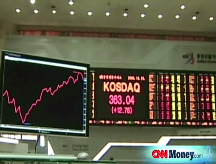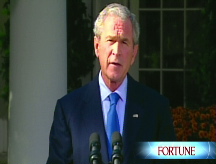Bank stocks miss the rally
Stocks surged Monday on hopes that the worst of the credit crisis may be over. Too bad someone forgot to invite bank stocks to the party.

 |
| Many bank stocks didn't take part in Monday's historic rally until the last hour of trading. |
NEW YORK (CNNMoney.com) -- The stock markets finally enjoyed a good day, cheered by the news that global governments are taking unprecedented steps to ensure that the world's banking system does not crumble.
The Dow shot up nearly 940 points, or 11%, on Monday while the S&P 500 and Nasdaq each gained nearly 12%, following similar surges in European and Asian stock markets.
But on a day when investors are rejoicing about steps taken to shore up confidence in banks, someone forgot to invite bank stocks to the rally.
Sure, Morgan Stanley (MS, Fortune 500) soared more than 85% thanks to the news that Japan's Mitsubishi UFJ (MTU) completed its deal to invest $9 billion in the embattled Wall Street firm. Citigroup (C, Fortune 500) and Goldman Sachs (GS, Fortune 500) were also standouts, gaining about 14% and 26% respectively.
But the S&P Banking Index trailed the broader market and was up only about 4.5%...and most of those gains came in the explosive last half hour of trading.
Shares of several top banks, including JPMorgan Chase (JPM, Fortune 500), Wells Fargo (WFC, Fortune 500) and U.S. Bancorp (USB, Fortune 500), were all trading flat to slightly down for most of the day before gaining ground in the last half hour.
One market strategist pointed out that these particular banks were all widely thought to be among the more conservative banks - i.e. the ones least at risk of a wholesale collapse.
With this in mind, investors might be showing that they are once again willing to make bets on more risky banks, the ones that stand to benefit the most from various bailout initiatives.
"Financials overall are trailing the pack but the companies leading the charge in the sector Monday were the ones pretty much on the ropes," said Jack Ablin, chief investment officer with Harris Private Bank in Chicago. "The market must have felt that some of the others were survivors and investors are pulling out money of those banks. It's the reverse flight to quality, a flight to speculation."
Still, while many banks lagged the rally Monday, the market leaders were in sectors like technology, healthcare and energy. Microsoft (MSFT, Fortune 500) was up nearly 19% and HP (HPQ, Fortune 500) gained 12.5%. Johnson & Johnson (JNJ, Fortune 500) was up more than 10%, as were Merck (MRK, Fortune 500) and Pfizer (PFE, Fortune 500). And in the oil patch, Exxon Mobil (XOM, Fortune 500) and Chevron (CVX, Fortune 500) both gained about 20%.
Phil Dow, director of equity strategy with RBC Wealth Management in Minneapolis, said that even with some details about the U.S. bank bailout plan starting to emerge, combined with actions taken by central banks and governments in Europe, it's not as if the banking sector is now a picture of health.
"It's still a troubled industry. Our best guess is that while the bailout may be a game changer, it doesn't mitigate all the risks," Dow said. "Some banks will probably not be rescued. The whole group is still sick."
As such, shares of several beaten down regional banks, including Zions Bancorp (ZION), Regions Financial (RF, Fortune 500) and Huntington Bancshares (HBAN), actually fell Monday.
Jeffrey Kleintop, chief market strategist with LPL Financial, an independent broker/dealer in Boston, added that it makes sense for banks to underperform because one of the plans for solving the credit crisis is for the Treasury Department to buy up stocks in banks.
An increased number of shares outstanding for banks should, in theory, dilute the value of bank stocks for current shareholders.
"This is great news for the rest of the economy because the credit markets may free up. But it's at the cost of shareholders for financial companies," Kleintop said.
Dow said that Monday's big rally may be less about restored faith in banks and more of a recognition that some non-banking companies that were dumped in last week's market rout may have been unfairly punished.
"It kind of got insane and overshot to the downside," he said, adding that investors should probably still clear of banks for the short-term and stick to quality companies in the healthcare and industrial sectors that are growing their dividends.
Ablin agreed that healthcare stocks may continue to benefit in the near-term because drug companies, biotechs and medical-equipment firms have tended to hold up better than other sectors during economic slowdowns.
"The near-term worry affecting the markets was credit and liquidity and the longer-term worry was an economic downturn," Ablin said. "The smoke is beginning to clear on the credit worry. So one reason healthcare stocks may be up is that they are well insulated from a global economic downturn."
And Kleintop said that tech stocks also look attractive, especially with many tech giants set to soon report third-quarter results in the coming weeks. He said the fact that IBM (IBM, Fortune 500) announced better-than-expected earnings last week is a good sign for the tech sector.
"Technology makes a lot of sense right now. Companies are going to be focused on productivity in this economy and should continue spending on technology," he said. "Many techs are posting solid earnings gains year-over- year and the numbers might be better than expected for tech this quarter."
So as strange as it might sound, even though the worst may finally be over for stocks because banks are getting back on track, investors probably would be wise to steer clear of banks and focus on other beaten-down sectors instead. ![]()



